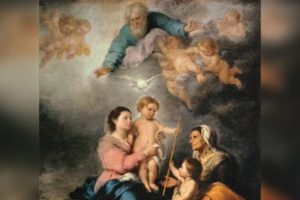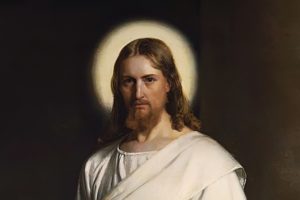The Bible’s Answer
Introduction
Yes, Jesus the Messiah’s resurrection was prophesied in the Old Testament. Jesus’ resurrection is a key messianic prophecy and a fundamental doctrine of the Christian faith. If Jesus were not raised, then our faith is futile, and we would still be in our sins, said the Apostle Paul (1 Corinthians 15:17). Since Paul taught that Jesus was indeed raised, that his resurrected body was seen by eyewitnesses, and that this was done “in accordance with the Scriptures,” let us examine the Bible to see where Jesus’ resurrection was foretold (1 Corinthians 15:3–8).
Messianic Resurrection Prophecies
In the book of Acts, after the Apostle Paul was invited to speak in a synagogue in Perga, Pamphylia, he declared:
But God raised him from the dead, and for many days he appeared to those who had come up with him from Galilee to Jerusalem, who are now his witnesses to the people. And we bring you the good news that what God promised to the fathers, this he has fulfilled to us their children by raising Jesus, as also it is written in the second Psalm, “‘You are my Son, today I have begotten you.’ And as for the fact that he raised him from the dead, no more to return to corruption, he has spoken in this way, “‘I will give you the holy and sure blessings of David.’ Therefore he says also in another psalm, “‘You will not let your Holy One see corruption. (Acts 13:30–35, ESVUK)
According to Paul in the passage above, Jesus’ resurrection was prophesied (listed in order) in Psalm 2:7, Isaiah 55:3, and Psalm 16:10. Likewise, when the Apostle Peter was talking to the Jews after the Holy Spirit had come upon Jesus’ disciples on the day of Pentecost, he quoted from Psalm 16:8–10 to prove that Jesus’ resurrection was prophesied:
this Jesus, delivered up according to the definite plan and foreknowledge of God, you crucified and killed by the hands of lawless men. God raised him up, loosing the pangs of death, because it was not possible for him to be held by it. For David says concerning him, “‘I saw the Lord always before me, for he is at my right hand that I may not be shaken; therefore my heart was glad, and my tongue rejoiced; my flesh also will dwell in hope. For you will not abandon my soul to Hades, or let your Holy One see corruption. You have made known to me the paths of life; you will make me full of gladness with your presence. (Acts 2:23–28)
Finally, Jesus himself declared that Jonah being in the belly of the great fish for three days and three nights (Jonah 1:17) was a sign of his own resurrection on the third day. In Matthew 12:38–40, we read the following:
Then some of the scribes and Pharisees answered him, saying, “Teacher, we wish to see a sign from you.” But he answered them, “An evil and adulterous generation seeks for a sign, but no sign will be given to it except the sign of the prophet Jonah. For just as Jonah was three days and three nights in the belly of the great fish, so will the Son of Man be three days and three nights in the heart of the earth. (Matthew 12:38–40)
You Will Not Let Your Holy One See Corruption
For you will not abandon my soul to Sheol, or let your holy one see corruption. (Psalm 16:10)
Regarding this passage, Paul made an excellent point when he commented: “For David, after he had served the purpose of God in his own generation, fell asleep and was laid with his fathers and saw corruption, but he whom God raised up did not see corruption” (Acts 13:36–37). In other words, because David died and his body decayed and, thus, saw corruption (contrary to what the passage says), he could not have been referring to himself in this passage. Jesus’ body, on the other hand, did not decay or see corruption, because God raised him from the dead only three days after he had died (Acts 10:39–41).
Peter also made an excellent point on this psalm when he said: “Brothers, I may say to you with confidence about the patriarch David that he both died and was buried, and his tomb is with us to this day. Being therefore a prophet, and knowing that God had sworn with an oath to him that he would set one of his descendants on his throne, he foresaw and spoke about the resurrection of the Christ, that he was not abandoned to Hades, nor did his flesh see corruption (Acts 2:29–31).
Peter taught that, because David was a prophet who knew God would one day set one of his descendants on his throne and continue David’s rule through him (2 Samuel 7:11–12, 16), David was prophesying his future descendent, who would be the Messiah (Isaiah 11:1–4). Because God would not abandon this descendant’s soul to Hades (or Sheol, that is, the realm of the dead), nor let his flesh see corruption, he must have died1 and then been resurrected before his body could decay. In this way, David was indeed prophesying the resurrection of the Messiah here.
Today I Have Begotten You
I will tell of the decree: The LORD said to me, “You are my Son; today I have begotten you. (Psalm 2:7)
Psalm 2 is about the nations plotting against God and his Anointed One (literally, Messiah), the King (Psalm 2:1–2, 6–7). In the passage that Peter and Paul quoted from (Psalm 2:7), we see Israel’s king at his coronation. It does not specify who the king is, but it is reasonable to believe that the author of that psalm had the Messiah in mind, especially because God said that “the ends of the earth” will be in his possession (Psalm 2:8) and “Blessed are all who take refuge in him” (Psalm 2:12).
But how does verse 7—“The LORD said to me, ‘You are my Son; today I have begotten you’” (Psalm 2:7)—prophesy the Messiah’s resurrection? The word “begotten” here implies “adoption.” 2 When commenting on verse 7, the New Bible Commentary says that “God figuratively adopted the kings of David’s line. … When used of Jesus at his resurrection (Acts 13:32–37) the meaning rather is that God has made publicly plain what had always been the case.” 3 The Moody Bible Commentary says that it “signifies not the production of Sonship … but rather the Father’s declaration of the Messiah’s Sonship as announced later by Gabriel (Lk 1:32), reiterated at Jesus’ baptism (Lk 3:22), and confirmed by His resurrection (Ac 13:33; Rm 1:4).” 4
Therefore, the words “You are my Son; today I have begotten you” refer to God publicly declaring the Messiah (that is, Jesus) to be his Son, and this was fully realised when God raised him from death. In other words, this prophecy can only be truly understood after the Messiah’s resurrection took place.
My Steadfast, Sure Love for David
Incline your ear, and come to me; hear, that your soul may live; and I will make with you an everlasting covenant, my steadfast, sure love for David. (Isaiah 55:3)
Paul quotes Isaiah 55:3 in this way: “I will give you the holy and sure blessings of David” (Acts 13:34). As we can see, it is a little different from the original prophecy. This is because, in Paul’s day, it was an acceptable practice for people to paraphrase Scripture when quoting it. In what way does this passage point to the Messiah’s resurrection, though?
The passage says that God makes his covenant with those who incline their ears and come to him in faith, on the basis of God’s “steadfast, sure love for David” (or, as Paul paraphrased, “the holy and sure blessings of David”). We observed above that God promised David that his reign would continue forever through one of his descendants (2 Samuel 7:11–12, 16), who would be known as the Messiah (Isaiah 11:1–4). The Lutheran Study Bible points out that, in Acts 13:34, “Is 55:3 addresses Israel; here it applies initially to Christ, who then extends the blessings promised to David for the sake of all believers in Israel.” 5 However, it would only be possible for the Messiah to reign on David’s throne forever if he were to be raised from death, as he was prophesied to die in Psalm 16:10 and Isaiah 53:8–9. Thus, the Messiah’s resurrection is presupposed in this prophecy as that which guarantees the blessings of David to all believers.
The Sign of Jonah
And the LORD appointed a great fish to swallow up Jonah. And Jonah was in the belly of the fish three days and three nights. (Jonah 1:17)
Throughout the Old Testament, the Messiah is often seen as a figure like the Old Testament prophets, but he would be even greater. For example, Moses was seen as the ideal prophet of God’s people (Deuteronomy 34:10–12), yet Moses himself prophesied a greater prophet like himself (the Messiah), who would teach Israel God’s own words (Deuteronomy 18:15–19; see also Hebrews 3:1–6). David was seen as God’s ideal king of Israel (1 Samuel 13:14), but the Messiah is said to be an even greater king than David, who would rule forever (Isaiah 9:6–7; see also Hebrews 1:8). The Levitical priests provided temporary atonement for God’s people through animal sacrifices (Numbers 28:3; Leviticus 16:15, 21–22), but the Messiah would offer the ultimate and perfect, once-for-all sacrifice (Isaiah 53:10; see also Hebrews 10:10–14).
It is reasonable to believe, then, that certain Old Testament events would foreshadow even greater Messianic events. According to Jesus, Jonah’s experience is one such example, acting as a “sign” that pointed to his own resurrection (Matthew 12:39). Jonah’s miraculous delivery from the great fish’s belly after three days (Jonah 2:7–10) foreshadowed Jesus’ even greater miraculous delivery from Sheol/Hades itself, being raised from the dead on the third day (John 2:19–21; 1 Corinthians 15:3–4).
Conclusion
According to the Lord of all, Jesus Christ, and the Spirit-filled apostles Peter and Paul, Jesus’ resurrection was prophesied in the Old Testament. Psalm 16:10, Psalm 2:7, Isaiah 55:3, and Jonah 1:17 all either foreshadow or imply the Messiah’s resurrection from the dead. When viewing the texts by themselves, this might not seem apparent, but in light of our Lord’s resurrection, we can clearly see that each of them had the Messiah’s resurrection in mind. Remember that Jesus’ own disciples did not understand that he had to die and rise again until he revealed it to them after he was raised (Luke 24:25–27). In this way, Jesus’ resurrection is a divinely revealed truth that is, at the same time, prophesied in the Scriptures (1 Corinthians 15:3–4).
Notes
1. Herald Gandi, “The Resurrection: ‘According to the Scriptures’?,” The Master’s Seminary, July 31, 2018, https://blog.tms.edu/resurrection-according-to-scriptures.
2. F. F. Bruce, ed., Zondervan Bible Commentary (Grand Rapids, MI: Zondervan, 2008), 533.
3. D. A. Carson et al., eds., New Bible Commentary (Nottingham, England: InterVarsity Press, 1994), 489.
4. Michael Rydelnik and Michael Vanlaningham, eds., The Moody Bible Commentary (Chicago, IL: Moody Publishers, 2014), 761.
5. Edward A. Engelbrecht et al., eds., The Lutheran Study Bible (St. Louis, MO: Concordia Publishing House, 2009) 1862.
Bibliography
Bruce, F. F., ed. Zondervan Bible Commentary. Grand Rapids, MI: Zondervan, 2008.
Carson, D. A., R. T. France, J. A. Motyer, and G. J. Wenham, eds. New Bible Commentary. Nottingham, England: InterVarsity Press, 1994.
Engelbrecht, Edward A., Paul E. Deterding, Roland Cap Ehlke, Jerald C. Joersz, Mark W. Love, Steven P. Mueller, Scott R. Murray et al., eds. The Lutheran Study Bible. St. Louis, MO: Concordia Publishing House, 2009.
Gandi, Herald. “The Resurrection: ‘According to the Scriptures’?” The Master’s Seminary. July 31, 2018. https://blog.tms.edu/resurrection-according-to-scriptures.
Rydelnik, Michael and Michael Vanlaningham, eds., The Moody Bible Commentary. Chicago, IL: Moody Publishers, 2014.






